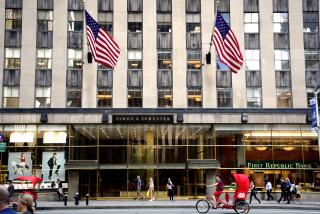Are Takeovers All We Know How to Do?
- Share via
They’re back--unfortunately. The stock market last week cheered evidence that takeovers will continue, barely two weeks after prices fell on fears that acquisitions were a fading force.
There was a $3-billion bid in the paper industry as Georgia-Pacific--one of the largest forest products companies at about $10 billion in sales--offered $58 a share for Great Northern Nekoosa, a medium-sized paper company at $4 billion in sales. While Great Northern considered the offer, its stock rose to a historic high of $63 in anticipation of other bids coming its way.
In the oil industry, Chevron stock rose to an all-time high of $69 on speculation that Pennzoil or somebody was quietly accumulating its shares.
Finally, Campbell Soup stock shot up 7% on Wednesday--after Chief Executive R. Gordon McGovern announced his early retirement--on speculation that the company would restructure or be sold.
The specifics only confirmed predictions made in a survey of executives of almost 500 large U.S. companies that merger and acquisition activity would continue to dominate the business community in the next five years.
Which is a forecast of disaster. U.S. business now spends almost as much time and money on merger and acquisition deal making as it does to improve products and services--to the scorn of foreign competitors who see this churning of assets as a disease.
Well, if it’s a disease, last week showed that it’s a virulent strain--and that stock market pressures have more influence on major U.S. companies than any other force. What it all means is that no matter what questions you may have about buyouts, they will continue to affect you for good or ill--whether you’re a stock player, a company employee or manager, or simply somebody who makes a living in the U.S. economy.
Chevron, for example, is selling at historic levels basically because the company’s chairman, Kenneth Derr, has said he’ll heed demands from security analysts and the investing institutions they represent. There probably won’t be a takeover of Chevron--a reasonable price for the whole company would be $35 billion, and analysts don’t think any buyer can come up with that.
But the market knows that Chevron will do something. Derr has promised, both in Chevron’s annual report and in meetings with security analysts, to take actions, such as sales of assets, to get the stock price up.
Ironically, some of the assets sold may be those that were acquired when Chevron bought Gulf Oil in 1984 in a $13-billion landmark deal that was cheered by the stock market. The cheers have turned to second-guessing: “The Gulf Oil acquisition was poorly timed,” says analyst Frederick Leuffer of the C. J. Lawrence brokerage. And though Chevron people disagree, saying that Gulf strengthened their company by increasing its oil reserves, the company will go along with the market’s latest opinion and dispose of assets--perhaps refineries in Philadelphia, El Paso, Salt Lake City and Hawaii. A sad footnote is that thousands of Gulf employees lost their jobs for something that the stock market now concludes was a mistake.
At Campbell Soup, consistent profitability and a good record in bringing out new products were unavailing for President McGovern. Stock analysts, and some family shareholders (seeking faster growth), demanded his head. Wednesday they got it, so Campbell stock rose.
On paper, it’s a case of expansion by conquest--Georgia-Pacific is trying to acquire a smaller, but highly successful, competitor. Great Northern Nekoosa has increased earnings dramatically in recent years, but its stock is lagging because investors see it heading into hard times.
Meanwhile, Georgia-Pacific’s stock price is relatively high because its aggressive chief executive, T. Marshall Hahn, has appealed to the stock market by repurchasing shares. “He didn’t build a lot of mills in the last few years,” notes analyst Gary Palmero, of Oppenheimer & Co. “So now he can buy Great Northern Nekoosa’s mills (10 mills and assorted box and envelope plants) cheaper than he could build them.”
Hahn maintains that the merged company will be more competitive globally--among other reasons because Georgia-Pacific’s ample timber resources can feed Great Northern’s mills economically. And he pledges job stability: “We’re operators, not liquidators,” he says.
Maybe so, but Braxton Associates, the Boston consulting firm that polled 475 companies about takeovers, reports that the aftermath of most acquisitions is unplanned confusion and distress. One reason for post-merger distress, of course, is that there’s pressure to pay off loans or to generate higher earnings to convince shareholders that the acquisition was a good idea. Georgia-Pacific will have to recover the $3-billion acquisition cost somehow.
Which raises the question: Is a takeover useful or necessary? Great Northern Nekoosa, which exports pulp to Europe and Japan, is on the verge of a great opportunity overseas. Europe--which consumes 350 pounds of paper per person, only half as much as the United States--is about to expand as an export market.
But will a Georgia-Pacific buyout, followed by a push for greater cash flow, help serve that market? Great Northern people doubt that it will. And so, you have to wonder if an alliance between the companies--to maximize the economies of timber supplies and mill capacity--wouldn’t be better than a complete acquisition. Employee morale wouldn’t suffer; export sales wouldn’t be endangered.
Suggesting alliances may sound naive, considering the big money being made in the stock market. But maybe other voices besides the stock market’s need to be heard; maybe other Americans affected by takeovers need reasons to cheer.
More to Read
Inside the business of entertainment
The Wide Shot brings you news, analysis and insights on everything from streaming wars to production — and what it all means for the future.
You may occasionally receive promotional content from the Los Angeles Times.










